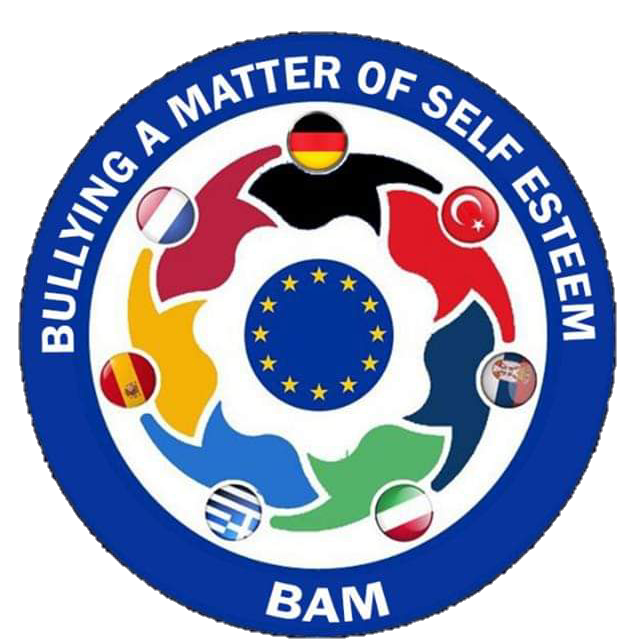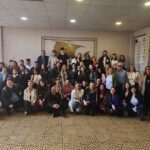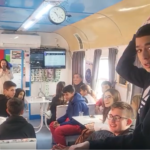Interview with Emely (student at SBK)

The following interview was conducted with 20-year-old Emely, who is a student at the Sophie-Scholl-Berufskolleg (SBK) vocational school for social pedagogy.
Emely talks about her own experiences of bullying, how she overcame difficult phases and that she would like to use the Erasmus project for her work at an open all-day school (OGS). The interview was conducted by Daniel Kober, teacher at SBK.
Kober: Emely, what motivated you to take part in today’s event as part of the Erasmus project “Bullying a matter of self-esteem”?
Emely: I think the topic of bullying is becoming more and more important. In my work in the open all-day program at an elementary school, I am confronted with situations in a professional context that may border on bullying and that I have to deal with. The interaction between some children is sometimes very rough and even minor conflicts escalate very quickly into verbal abuse.
Kober: So today’s participation is primarily professionally motivated?
Emely: No, it’s an important aspect and I’m very grateful that I was given time off work to take part today. Of course I want to learn new things that I can use in my job. At the same time, however, the topic of bullying also affects me personally.
Kober: How personally?
Emely: I was bullied as early as kindergarten. I was quite a sensitive child, was very introverted, cried a lot and found it difficult to make friends.
Kober: Was this more of a passive form of bullying in the sense that you were ignored or were you actively excluded?
Emely: It was already a very active form of bullying. There were lots of phrases like “we don’t want you to play with us”. That was very difficult for me as a small child and the teachers didn’t really intervene, although they noticed the moments and comments.
Kober: Did the bullying subside after kindergarten?
Emely: Unfortunately, no. I was hardly able to make any friends until the 8th grade. I was often openly insulted or bullied behind my back. It went so far that even “friends” spoke badly about me in my absence or said to my face, I actually find you annoying, but at least you can listen. It was very hurtful for me and I lost trust even in my friends.
Kober: Were there people who helped you when you were being bullied?
Emely: I can remember one thing very well. Back then, I chose social sciences as an elective subject. There were two parallel courses because there were so many students. I was severely bullied in my group. It got to the point where my desks and chairs were knocked over. So I asked to be able to switch to the parallel course. The teacher first wanted to get her own impression and then decide. My “stroke of luck” was that at the moment the teacher came into the classroom, my table and chair were knocked over and the others had insulted me. So I was able to go straight to the other class.
Kober: Did the switch to the other course help you?
Emely: In the other course, I had the feeling for the first time that I was allowed to be who I am. That I was okay. I made friends there and even found my first relationship.
Kober: A very positive change for you! Looking back, what support would you have liked?
Emely: The teachers should simply have intervened more actively. There were numerous conflicts that they witnessed and where nothing was done. Once I asked for help, but the only answer I got was that I would have done something and that was the end of the matter. My experience over the years was that nobody would help me anyway. My family’s advice was that I should fight back physically, but I’m just not that kind of person.
Kober: Earlier in the lecture, we heard about bystanders, people who witness bullying and don’t intervene, and upstanders, those who get involved and support the bullied. Have there been upstanders in your life?
Emely: Yes, there was a physical altercation once. Many people stood around but didn’t do anything. I didn’t know what to do. So I actively asked the others for help. As a result, they suddenly had to choose whether to help or look away. Some then stepped in and helped me.
Kober: Unfortunately, you have experienced bullying in your life and have encountered different perpetrators. Do you have any idea how one becomes a perpetrator?
Emely: It all starts at home. If the parents aren’t looking, there is no control and the children take over. The motto should be “Take the perpetrators’ space”. As parents, as a class, as a circle of friends and perhaps as a society. Where we look away, the perpetrators retain their freedom of action. This also applies to the internet. We heard earlier that 75% of parents do not monitor their children’s internet use. They can continue to bully anonymously.
Kober: Since you’re talking about cyberbullying, what particular dangers do you see there?
Emely: I think if you have been or are being bullied in real life, there is a higher chance that this will continue digitally. You also become more susceptible to phenomena such as grooming because there is someone there who talks to you normally, gives positive feedback and pays attention.
Kober: We’ve moved on from your professional motivation to your personal experiences. Thank you for your openness. Perhaps some students reading this interview will have similar experiences and feel encouraged by you to talk openly about their bullying problems so that they can get help.
Emely: Then the bullying would have helped after all (laughs). I hope my experiences help others. I am more sensitive when my students tell me that they are experiencing negative things or are being bullied. I take them seriously straight away. I want to learn to change my perception. Sometimes it happens to me, for example when I joined a new class, that I thought “oh dear, you’re going to be bullied by this person in the future”. In hindsight, however, it turned out that the appearance or just the name reminded me of people from my past. I get on very well in my current class and feel accepted.
Kober: At today’s event, I didn’t perceive you as introverted, quite the opposite. You were very actively involved in the discussion, even in English.
Emely: That was a long process for me. I would describe myself as ambivert, i.e. somewhere between introvert and extrovert. If I feel comfortable in an environment, am accepted and don’t think that people will react strangely to me, I can open up and am happy to get involved.
Kober: Emely, I hope that you have many of these positive experiences in the future, that you can support your children at work and that you will be a strong voice against bullying. Thank you very much for the interview!






